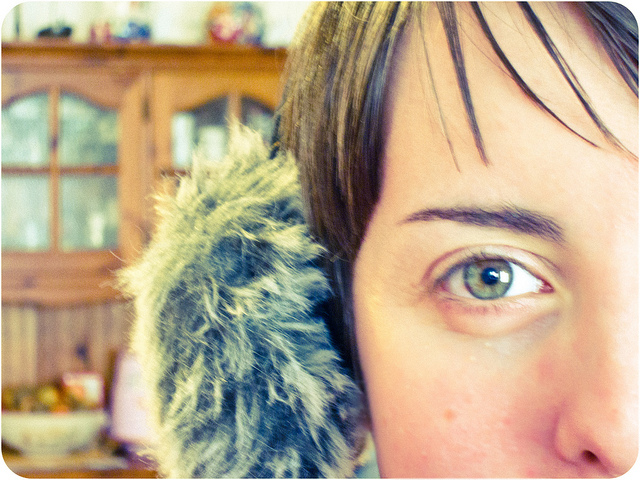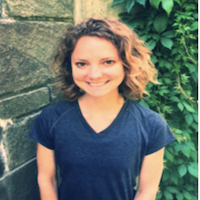“Today, I see more people…more women…than I have ever seen at a protest!”
Fists pumped. There were claps, whistles, and hollers. Cheers bellowed out all around me.
“Specifically, white women…and this is wonderful…but, I have to ask, why now?”
A hush fell over the crowd, cheers overcome by the awkward tension created by the speaker asking people to face their privilege.
After hours spent in the cold rain, my fingers had lost all color and feeling, my body was drenched and chilled to the core, and I was only planning to make a pit stop at the porta potties before I trudged back across the city to my home.
It was a somber day for me. Throughout the march, I had remained mostly silent, observing sadness, pain, fear, denial, and anger in the crowd around me. I was marching as an ally for my marginalized, exploited, discriminated, and oppressed sisters and brothers to protect their rights, safety, health, and families. I was marching for myself, a woman and survivor of sexual abuse, coercive relationships, an eating disorder, and emotional traumas.
Although I was moved by the strength of incredible citizens marching by my side, I also felt like a tiny ant at the bottom of a long and steep hill.
I wasn’t planning to stay for the speeches at the end of the march; my fingers were dangerously cold, and my bones rattled with my shivers. The woman speaking at the end of the march had taken an aggressive stance toward the white women in the crowd. Instead of patting us on the back for standing up for what we believe in, she asked us to look deeper. She asked us to examine our privileges, to raise our voices, to join the resistance.
“Where were you for our Black Lives Matter rallies?”—deafening silence.
“Or when we rallied for “Standing Rock?”—utter stillness.
As I began walking away, I told myself it was because I was cold and not planning to stay for the speech anyway, and I already understood her reason for pointing out privilege. I repeated this to myself as she pled with the crowd that had turned away from her. I repeated this to myself as I walked home. I kept repeating it to myself as the words haunted me through the evening—spent in my warm house, justifying my actions with sympathetic friends.
And I kept repeating it for a week, until I finally called bullsh*t on myself.
I had walked away from that woman because she was forcing me to examine something that was incredibly uncomfortable.
While I have spent time investigating my white, cis-gendered, middle class, graduate-school-educated, able-bodied, heterosexual, American identity, I have not been as vocal about my privilege to myself or my community.
Hell, in college, I worked in public health and I sucked up as many women’s studies and sociology classes as I could. My interest and dedication to personal and community growth abounds. My empathy toward the pain, sorrow, trauma, rage, and fear of those around me is at times overwhelming. But on the privilege spectrum, I’m doing quite well.
This wasn’t the first time my privilege has been brought to my attention, halting me in my blind walk through a self-centered life. Fortunately, brave individuals have graced me with priceless insight on my insensitive, unconscious, and offensive thoughts, words, and behavior.
Of course, I like to think of myself as a caring, responsible, aware individual…don’t we all? But, it is my duty as someone who is dedicated to the liberation of all individuals, regardless of gender identity, religion, economic status, ability level, sexual orientation, citizenship, education level, and gender to:
>> Swallow my pride.
>> Listen hard.
>> Examine my personal life circumstance, my privileges, and my duty as an ally to ensure equality and liberation for all individuals.
>> Acknowledge and give thanks to those who have stood up in the past for my current freedoms.
>> Speak up when I see/hear/feel societal privilege taking place (in the media, for example).
>> Continue to engage in events that push me out of my comfort zone to further evolve as a human dedicated to change.
When I finally called myself out, I realized that to this day, after multiple wake up calls, I still had a difficult time acknowledging my privilege. The woman speaking to us at the march was not trying to shame us. She wasn’t trying to divide our group or hurt us.
She was simply doing the work that must be done to ensure equality of all individuals.
And it forced me to dive even deeper, to see how I experience opportunities and services differently due to my identities and background.
If I could go back in time, I would stand my ground. I would let my fingers be cold for a few more minutes. I would breathe through the discomfort that recognizing my privilege sometimes creates. I would listen to this woman with respect for her stance. I would not get defensive or feel guilty. That woman speaking was brave. She dared to help us go inward, dig deeper, go further.
And her message, although aggressive, was what I needed to hear.
~
Author: Valerie Brown
Image: iesse/Flickr
Editor: Catherine Monkman











Read 0 comments and reply